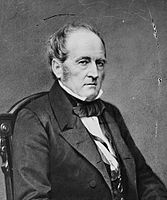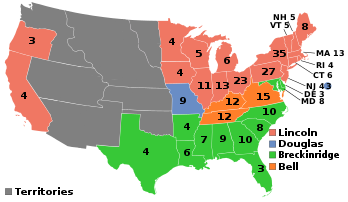Presidential election of 1860
|
|
|||||||||||||||||||||||||||||||||||||||||||||||||||||||||||||||||||||||||||
|
|||||||||||||||||||||||||||||||||||||||||||||||||||||||||||||||||||||||||||
|
|||||||||||||||||||||||||||||||||||||||||||||||||||||||||||||||||||||||||||
|
|
|||||||||||||||||||||||||||||||||||||||||||||||||||||||||||||||||||||||||||
| Presidential Election 1860. Red shows states won by Lincoln/Hamlin, green by Breckinridge/Lane, orange by Bell/Everett, and blue by Douglas/Johnson Numbers are Electoral College votes in each state by the 1850 Census. |
|||||||||||||||||||||||||||||||||||||||||||||||||||||||||||||||||||||||||||
|
|||||||||||||||||||||||||||||||||||||||||||||||||||||||||||||||||||||||||||
The United States presidential election of 1860 was the 19th quadrennial presidential election to select the President and Vice President of the United States. The election was held on Tuesday, November 6, 1860, and served as the immediate impetus for the outbreak of the American Civil War.
The United States had been divided during the 1850s on questions surrounding the expansion of slavery and the rights of slave owners. Incumbent President James Buchanan, like his predecessor Franklin Pierce, was a northerner with sympathies for the South. He recommended that Supreme Court Justice Robert Grier vote proslavery in the Dred Scott v. Sandford case of 1857. This was so unpopular it backfired on Buchanan's presidency, allowing the Republican Party to win a majority in the House in 1858 and full control of Congress in 1860. Buchanan declined to seek re-election. In 1860, these issues broke the Democratic Party into Northern and Southern factions, and a new Constitutional Union Party appeared. In the face of a divided opposition, the newly created Republican Party (founded in 1854) secured a majority of the electoral votes, putting Abraham Lincoln in the White House with almost no support from the South.
...
Wikipedia






